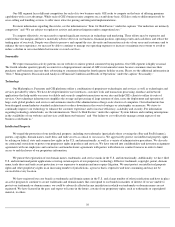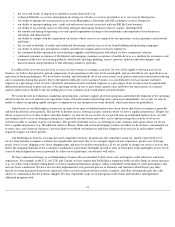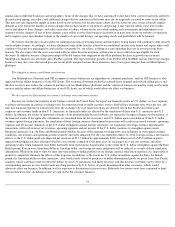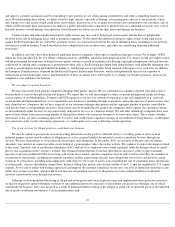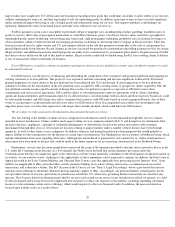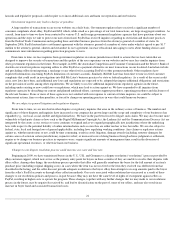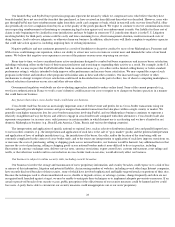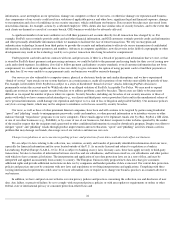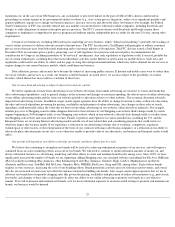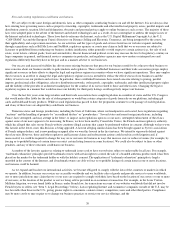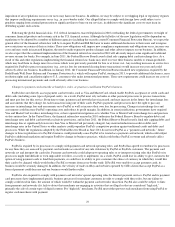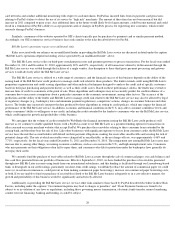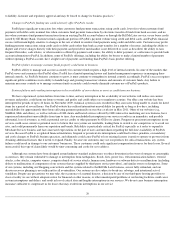eBay 2011 Annual Report Download - page 24
Download and view the complete annual report
Please find page 24 of the 2011 eBay annual report below. You can navigate through the pages in the report by either clicking on the pages listed below, or by using the keyword search tool below to find specific information within the annual report.
and improve customer satisfaction and by responding to new patterns we are seeing among counterfeiters and others committing fraud on our
users. Notwithstanding these efforts, we believe that the legal climate, especially in Europe, is becoming more adverse to our positions, which
may require us to take actions which could lower our revenues, increase our costs, or make our websites less convenient to our customers, any of
which could materially harm our business. In addition, a public perception that counterfeit or pirated items are commonplace on our sites, even if
factually incorrect, would damage our reputation, lower the price our sellers receive for their items and damage our business.
Content owners and other intellectual property rights owners may also seek to bring legal action against entities that are peripherally
involved in the sale of infringing items, such as payment companies. To the extent that intellectual property rights owners bring legal action
against PayPal based upon the use of PayPal's payment services in a transaction involving the sale of infringing items, including on our websites,
our business could be harmed. Several jurisdictions have adopted new laws in these areas, and others are considering imposing additional
restrictions.
In addition, new laws have been proposed regulating Internet companies with respect to intellectual property issues. For example, SOPA,
which has been introduced in the U.S. House of Representatives, and PIPA, which has been proposed in the U.S. Senate, would give rights owners
and the government broad powers to bring lawsuits against websites accused of enabling or facilitating copyright infringement, and such lawsuits
could result in, among other consequences, payment providers such as PayPal being precluded from doing business with allegedly infringing sites,
as well as search engines being precluded from linking to, and Internet service providers being required to block access to, such sites. In addition,
the European Commission has reopened the Intellectual Property Enforcement Directive, which could potentially increase our exposure to
enforcement actions from rights owners. Implementation of these or similar laws could require us to change our business practices, increase our
compliance costs and harm our business.
We are subject to patent litigation.
We have repeatedly been sued for allegedly infringing other parties' patents. We are a defendant in a number of patent suits and we have
been notified of several other potential patent disputes. We expect that we will increasingly be subject to patent infringement claims involving
various aspects of our Marketplaces, Payments and GSI segments as our services continue to expand in scope and complexity (e.g., our local,
social, mobile and digital initiatives), as we expand into new businesses, including through acquisitions, and as the universe of patent owners who
may claim that we, companies that we have acquired, or our customers infringe their patents and the aggregate number of patents controlled by
such patent owners correspondingly increases. Such claims may be brought directly against our companies and/or against our customers (whom
we may indemnify either because we are contractually obligated to do so or as a business matter). We and other technology companies have seen
more of these claims from an increasing number of third parties whose sole or primary business is to assert such claims. These claims, whether
meritorious or not, are time consuming and costly to resolve, and could require expensive changes in our methods of doing business, could require
us to enter into costly royalty or licensing agreements, or could require us to cease conducting certain operations.
Use of our services for illegal purposes could harm our business.
We may be unable to prevent our users from selling unlawful or stolen goods or unlawful services, or selling goods or services in an
unlawful manner, and we may be subject to allegations of civil or criminal liability for unlawful activities carried out by users through our
services. We have been subject to several lawsuits based upon such allegations. In December 2004, an executive of Baazee.com, our Indian
subsidiary, was arrested in connection with a user's listing of a pornographic video clip on that website. We continue to contest the charges related
to this arrest. Similarly, one of our Korean subsidiaries (IAC) and one of its employees were found criminally liable for listings (which occurred
prior to our acquisition of IAC) on IAC's website. The German Federal Supreme Court has ruled that we may have a duty to take reasonable
measures to prevent prohibited DVDs from being sold on our site to minors and that competitors may be able to enforce this duty. In a number of
circumstances, third parties, including government regulators and law enforcement officials, have alleged that our services aid and abet certain
violations of certain laws, including antiscalping laws with respect to the resale of tickets, laws regarding the sale of counterfeit items, the fencing
of stolen goods, selective distribution channel laws, distance selling laws and the sale of items outside of the U.S. that are regulated by U.S. export
controls. As we seek to reduce bad buying experiences and improve the customer experience on our sites, our level of interaction with buyers and
sellers may increase over time, which could in turn increase our potential exposure to allegations of civil or criminal liability for unlawful
activities carried out by users through our services.
Although we have prohibited the listing of illegal and stolen goods and certain high-risk items and implemented other protective measures,
we may be required to spend substantial resources to take additional protective measures or discontinue certain service offerings, any of which
could harm our business. Any costs incurred as a result of potential liability relating to the alleged or actual sale of unlawful goods or the unlawful
sale of goods could harm our business. Certain manufacturers and
19



